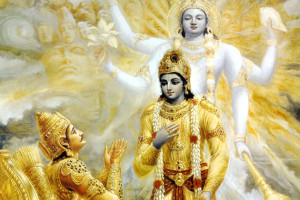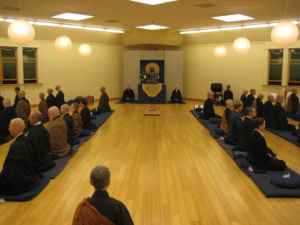 – Krishna revealing to Arjuna the timeless Way of the Yogis.
– Krishna revealing to Arjuna the timeless Way of the Yogis.
“In this world there are two orders of being: the perishable, separate creatures and the changeless Spirit. But beyond these there is another, the Supreme Self (Brahman), the eternal Lord, who enters into (or manifests) the entire cosmos and supports it within. I am that supreme Self, praised by the scriptures as beyond the changing and the changeless. Those who see in me that Supreme Self see truly. They have found the Source of all Wisdom, Arjuna, and they worship me with all their heart.”
The End of Religion
In the West, everything is a debate. Politics is Democrat vs. Republican; economics is Capitalism vs. Socialism; and religion is so often unfortunately painted as religion vs. science, or even as one religion vs. another. Atheists argue that all religion is a lie, and the religious respond with equally passionate claims of dogmatic surety. We often and unwisely approach religion as a problem to be solved with our intellect, or as an “argument” to be won by debate. Does it ever occur to us that God is an experience that is not confined by any tradition, that cannot be confirmed or denied by the perishable human intellect?
When I first began my spiritual search seven years ago, I was immediately drawn to the religions of the East like Taoism, Hinduism as expressed in the Bhagavad Gita, and especially Zen Buddhism. What most intrigued me about them was the idea that the Divine was not something outside of me to be “believed” in, but an actual experience that is the essence of what we ultimately are. These religions were not “true” or “untrue” in the intellectual sense of the word, but merely described paths to an experience that is beyond all words and concepts. To “have faith” in this sense was not to have faith in a God in heaven, but to have faith that through spiritual practice the experience of God is possible to have for yourself.
 – The meditation hall at Great Vow Zen Monastery, where I have lived for 9 months and have participated in 10 sesshins. I have also done one 10 day Vipassana retreat (as taught by SN Goenka), which I highly recommend.
– The meditation hall at Great Vow Zen Monastery, where I have lived for 9 months and have participated in 10 sesshins. I have also done one 10 day Vipassana retreat (as taught by SN Goenka), which I highly recommend.
